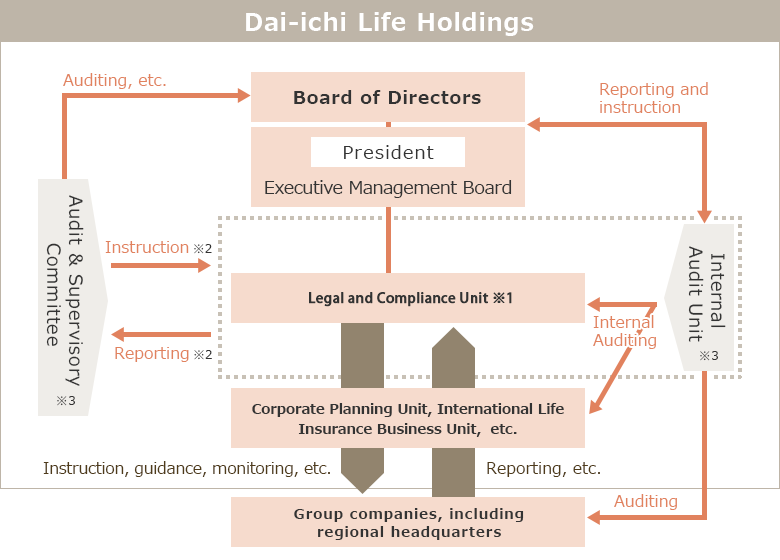Basic Recognition
All Dai-ichi Life Group's organizations are united in their resolve to reject any coercion from antisocial forces that threatens the order and security of civil society or that disrupts sound economic and social development or corporate activities. The Dai-ichi Life Group is fully committed to halting the development of any relationships with these forces in all of its transactions to prevent any damage from occurring.
Policies, Regulations, etc. Associated with the Handling of Antisocial Forces
In accordance with the Group Basic Policy on Handling of Antisocial Forces based on the Group Basic Internal Control Policy, which establishes basic approaches and policies to halt the development of any relationships with antisocial forces in order to prevent any damage, the Company has established Group Antisocial Forces Handling Regulations, strengthening its unified Group-wide stance towards eliminating antisocial forces.
Systems of the Dai-ichi Life Group for Handling Antisocial Forces
The Dai-ichi Life Group has designated the Legal and Compliance Unit to be in charge of streamlining and strengthening systems to block the development of any relationships with antisocial forces or to prevent damage that may occur, taking into account the attributes of each company, and has given guidance and support as required in taking an appropriate response as a group.
We regularly monitor the status of group companies and receive reports on initiatives to eliminate antisocial forces from group companies as Group-wide responses.
The Dai-ichi Life Group has made preparations whereby in the event business with an antisocial force is identified, the matter is reported to a director or other officer in a timely and appropriate fashion and efforts are made to promptly cut off the ties in question. Top management is also appropriately involved through procedures including regular reporting to the Board of Directors concerning the handling status of efforts to sever ties with antisocial forces.
In addition, to ensure that we have no relations with and to prevent damage related to antisocial forces, the Company is permanently committed to developing close cooperative systems with external specialist organizations, such as local police offices, National Center for Removal of Criminal Organizations, and lawyers.
Organizational Structure of the Dai-ichi Life Group for Severing Relations with Antisocial Forces and Preventing Damage

- ※1
General Affairs Unit coordinates with other units as appropriate.
- ※2
Dotted frame shows the entities which Audit & Supervisory Committee makes instruction to, and receives reporting from.
- ※3
Audit & Supervisory Committee and Internal Audit Unit coordinate with each other.
Systems of the company for Handling Antisocial Forces
The Company has designated the Legal and Compliance Unit to be in charge of streamlining and strengthening systems to block the development of any relationships with antisocial forces or to prevent damage that may occur in daily operations.
The Company has made preparations whereby in the event business with an antisocial force is identified, the matter is reported to a director or other officer in a timely and appropriate fashion and efforts are made to promptly cut off the ties in question. Top management is also appropriately involved through procedures including regular reporting to the Board of Directors concerning the handling status of efforts to sever ties with antisocial forces.
In addition, to ensure that we have no relations with and to prevent damage related to antisocial forces, the Company is permanently committed to developing close cooperative systems with external specialist organizations, such as local police offices, National Center for Removal of Criminal Organizations, and lawyers.